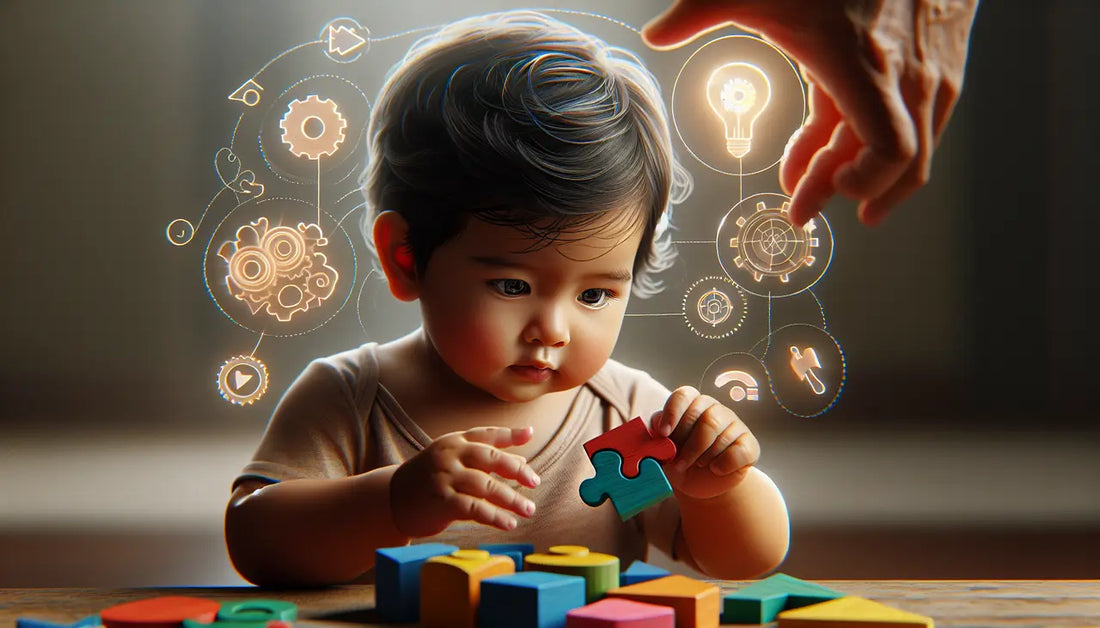Introduction to Toddler Puzzles and Their Importance
Toddler puzzles do more than just keep your little one busy. They are key tools in developing their tiny minds and bodies. When toddlers work on a puzzle, they're not just playing; they're solving problems. Their fingers picking up, moving, and fitting puzzle pieces together boost their motor skills, making their movements more precise. It's not just about the physical, though. Puzzles challenge their minds, introducing concepts like shapes, colors, and patterns. This mental workout strengthens cognitive abilities, laying the foundation for future learning in areas like math and reading. In simple terms, puzzles teach toddlers how to think, plan, and solve problems—skills they'll use for the rest of their lives.

The Link Between Toddler Puzzles and Motor Skill Development
Introducing toddler puzzles to your little one isn't just about killing time. It's a crucial step in gearing up their motor skills. Think about it. When they grasp and fit puzzle pieces, those tiny hands and fingers are actually getting a workout. These movements are not random; they are what we call fine motor skills. They are the small movements that use the muscles in the hands and fingers. Now, motor skills aren't just about the strength in their hands; it's also about coordination. Fitting a puzzle piece in its place is like hitting a tiny target. It requires the eyes and hands to work together smoothly. This is why puzzles are a big deal. They don't just keep your toddler busy; they lay down the foundations for skills they'll use for life – like writing, typing, or even tying their own shoes. So, next time your kiddo is piecing together a puzzle, remember, they're not just playing; they're growing.
How Toddler Puzzles Support Cognitive Growth
Toddler puzzles aren’t just toys—they’re brain builders. When little hands move puzzle pieces into place, it’s not just a game. It’s a workout for the brain. This kind of play encourages problem-solving. Kids look at shapes and think hard about where they fit. It’s like a lightbulb going off when they get it right. Puzzles also teach cause and effect. “If I move this piece here, it fits!” This realization helps toddlers understand their actions have results. Another big win? Vocabulary growth. As kids name shapes, colors, and what’s in the picture, they’re putting words to the world around them. Memory gets a boost too. Remembering which pieces they’ve tried and where they go strengthens this skill. So, every time a toddler tackles a puzzle, they’re not just having fun. They’re turning gears in their mind, setting a strong foundation for learning and thinking that lasts.
Choosing the Right Puzzles for Different Age Groups
Picking the perfect puzzle for your toddler isn't just about grabbing the first box you see with a colorful picture. It's about matching the puzzle to your kid's age and skill level. For toddlers under 2 years, start simple. Go for large, chunky pieces they can grip easily. These puzzles often have just a few pieces, making it easier for those little hands to sort and fit them into place. Think of puzzles with big wooden pieces shaped like animals or cars; they are not just fun but also safe for those inevitable moments when everything ends up in their mouth.
For the 2 to 3-year-old kiddos, it's time to get a bit more challenging. Puzzles with slightly smaller pieces and more complex images are perfect. Look for puzzles that come in 5 to 10 pieces. This age group is all about exploring and asking "why?" So, finding puzzles that spark their curiosity and keep them engaged is the key. Jigsaw puzzles that create a scene or puzzles that mimic everyday objects are great choices. They help toddlers start recognizing shapes and how different parts come together to form a whole.
Once they hit ages 3 to 5, children are ready for puzzles that push their skills further. This is the time to introduce puzzles with more pieces and detailed images—think 10 to 50 pieces. Puzzles that tell a story or involve characters from their favorite books or TV shows can make the activity more engaging. At this stage, it's all about challenging them just enough to keep them interested without causing frustration. It's a fine balance. Bonus points if the puzzle has educational elements, like maps or animals, to feed their growing curiosity about the world around them.
Remember, the goal is to keep it fun and encourage learning without turning it into a chore. The right puzzle at the right time can make a big difference in developing those motor skills and cognitive abilities. So, pick wisely and watch your little one grow smarter and
The Role of Complexity in Puzzle Selection
Choosing the right puzzle for your toddler isn't just about grabbing the first box you see on the shelf. The complexity of the puzzle plays a big role in how much your little one will benefit from it. Simple puzzles with big pieces are great for younger toddlers. They learn how to grab and fit pieces together, which boosts their motor skills. As they grow, puzzles with more pieces and intricate designs challenge them more. This is where cognitive growth kicks in. They start to recognize patterns, shapes, and colors. It's all about finding the sweet spot—too easy, and they get bored; too hard, and they may get frustrated. Start simple and gradually increase the complexity. This way, you're hitting the right balance, encouraging learning while keeping it fun.
Integrating Toddler Puzzles into Daily Playtime
Getting toddlers to play with puzzles during daily playtime is pretty straightforward and massively beneficial. Just think of puzzles as gym equipment for the brain and hands. Start with simple puzzles that match their skill level - usually, puzzles with big pieces and bright colors do the trick. Every day, set aside some time for puzzles. This could be right after snack time when their little hands are not too busy, or during that afternoon lull when energy dips a bit.
Here's the deal: keep it fun, not a chore. If they're not feeling it one day, that's fine. Forced puzzle time is no one's friend. Remember, the goal is to weave this into playtime so seamlessly they look forward to it.
You can make it more interesting by setting themes for puzzle play like animals, vehicles, or shapes days. Celebrate their successes, no matter how small. Completed a puzzle? Do a little celebration dance or have a special high-five.
Most importantly, be right there with them. Kids love company, and having you there makes it a special bonding time. Plus, you can guide them softly, give hints, and ensure they're handling the pieces safely.
Integrating puzzles into daily playtime is about making smart, strategic moves for your toddler's development while keeping the vibe light and enjoyable.
Encouraging Your Toddler: Tips and Tricks
To spark your toddler's interest in puzzles, make it a fun and engaging activity. Start with simple puzzles that have large pieces, which are easier for little hands to handle. Cheer them on as they find where each piece goes, celebrating their successes to boost their confidence. Play together, guiding them gently but letting them figure out most of it. This builds persistence and problem-solving skills. Create a cozy, distraction-free zone where they can focus on their puzzle. Remember, the goal is to make learning enjoyable, so keep the sessions short but regular. This way, puzzles become a game they look forward to, not a chore.
Observing Your Child's Development Through Puzzle Play
Watching your child tackle a puzzle is more than just a way to keep them busy. It's a live insight into their developing mind and body. Here's the deal: as your toddler picks up, moves, and fits puzzle pieces together, they're not just playing. They're boosting their motor skills bigtime. Think about it – those small, fiddly pieces require a lot of hand-eye coordination and fine motor skills to manage. And every time they figure out where a piece goes? That's a win for their problem-solving skills and cognitive growth. Spotting patterns and understanding shapes get their brain gears turning, laying down the building blocks for future learning, especially in math and reading. Plus, puzzle play sparks patience and focus, virtues that even adults struggle with. So, next time you see your toddler with a puzzle, pay close attention. They're not just fitting pieces together; they're piecing together vital skills for their growth journey.
Additional Activities to Support Motor and Cognitive Skills
To boost your toddler's motor and cognitive skills, blend puzzle time with these simple activities. Playing catch or rolling a ball back and forth teaches hand-eye coordination, a crucial motor skill. For tiny fingers, activities like stacking blocks or cups enhance fine motor skills and problem-solving. Interactive reading sessions can grow vocabulary and comprehension, turning story time into a cognitive boost. Don't forget sing-alongs and simple dance moves; music and movement can sharpen both memory and motor skills. These activities, combined with puzzle time, make for a well-rounded approach to your toddler's development.
Summary: The Lasting Benefits of Toddler Puzzles
Puzzles are not just toys. They are brain-building tools that have a lasting impact on toddlers. When little ones work to fit pieces together, they're not only having fun; they're developing critical skills that will serve them for years to come. Puzzles boost motor skills as toddlers grasp, pinch, and place pieces. This fine tunes their muscle control and hand-eye coordination. But the benefits don't stop there. Puzzles are like a workout for the brain, enhancing cognitive growth. They teach toddlers about shapes, colors, and problem-solving. Working through a puzzle requires focus and patience, skills valuable in any setting. Plus, finishing a puzzle gives a boost of confidence and satisfaction, reinforcing a love for learning. So, the next time you see a toddler piecing together a puzzle, remember, they're laying down the foundation for a sharp mind and a coordinated body.

